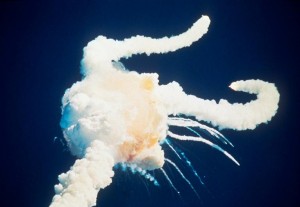Republican presidential candidates are debating at this very moment.
I’m a bit weary from listening to it all, so I’ll recall a tragic moment in U.S. history.
Thirty years ago today, the phone rang on my desk at the Beaumont Enterprise. I answered it. It was my wife, who worked down the street in downtown Beaumont, Texas.
“What’s going on? I just heard the shuttle blew up,” she said.
I turned to my computer, punched up the wire and saw the bulletin: “Challenger explodes.”
I blurted out a curse word and told her “I gotta go!”
I turned on the TV. The video was horrific.
Seventy-three seconds into a flight the shuttle Challenger blew up and seven astronauts were dead . . . in an instant.
We were stunned at our newspaper. We stood there, transfixed by what was transpiring. We heard over and over the radio communication to the Challenger, “Go at throttle up.” Then came the blast. It was followed by silence before the communicator told the world, “Obviously a major malfunction.”
I wouldn’t feel that kind of shock until, oh, the 9/11 attacks 15 years later.
But what happened next at our newspaper was that we would plan to do something the paper hadn’t done since the attack on Pearl Harbor. We decided to publish an “Extra.”
It contained eight pages of text and photos from that ghastly event. It contained an editorial page, which I cobbled together rapidly. I wrote a “hot” editorial commenting on the grief the nation was feeling at that very moment.
We went to press about noon that day and we put the paper in the hands of hawkers our circulation department brought in to sell the paper on the street. It went into news racks all over the city.
Through it all the tragedy reminded us — as if we needed reminding — of how dangerous it is to fly a rocket into Earth orbit.
Of course, it would be determined that a faulty gasket malfunctioned in the cold that morning in Florida. The shuttle fleet would be grounded for a couple of years while NASA figured out a way to prevent such tragedy from happening in the future.
We would feel intense national pain, of course, in February 2003 when the shuttle Columbia would disintegrate upon re-entry over Texas, killing that crew as well — including the mission commander, Amarillo’s very own Air Force Col. Rick Husband.
They both brought intense pain to our nation.
Challenger’s sudden and shocking end, though, remains one of those events where we all remember where we were and what we were doing when we heard the news.
And to think that some Americans actually thought those space flights were “routine.”
